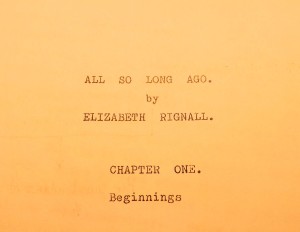Elizabeth Rignall (B. 1894): Purpose and Audience
And I can now say, with complete honesty, that I think the life I have had was right for me.
Regenia Gagnier claims in her article, ‘Working-Class Autobiography, Subjectivity, and Gender’, that working-class authors tend to justify their writing by asserting the practical purpose of their memoir: ‘The autobiographers insisted upon their own histories, however difficult it was to write them, and they unanimously state that their reasons for writing are functional rather than aesthetic (Gagnier, 342). This is certainly the case in All So Long Ago, as Elizabeth is writing at the age of 79 and declares the desire to document her memories while she is still able: ‘I am practically incapacitated physically by arthritis, blood pressure and diverticulitis. Beside all these considerations I did want to complete this little chronicle while I still have my mental faculties’ (Rignall, 129). She further highlights the way in which writing has alleviated her mind during her debilitated condition: ‘Now it is done, and I must find another project to occupy my mind’ (Rignall, 129).

Whilst Elizabeth does not specify if her autobiography is intended for anyone in particular, she does imply her family are aware of her work in progress. This is demonstrated by the correspondence with her brother in Australia, reminiscing on a private joke they shared during WWI when Elizabeth would return home with a small supply of chocolate every Thursday: ‘“Tonight’s the night!” and it was this phrase that Bert recalled to me in his letter, I having forgotten all about it’ (Rignall, 90). As she remained unmarried and had no children of her own, it would make sense that Elizabeth would want to chronicle her experiences and circulate it amongst her family and loved ones, for her memoir can be seen as a lasting legacy of her life.
The tone of Elizabeth’s autobiography sometimes feels like a novel, in that she uses an array of literary devices to captivate her reader. Vivid descriptions are used to depict people, such as the imagery of her brother, Lambert: ‘as he grew he was a slim, merry little grig, with a head of almost white hair and hazel eyes much too large for his little face’ (Rignall, 60). Throughout her account, she uses colloquial expression to capture the strong Yorkshire accent of her family, giving the reader a realistic impression of her down-to-earth grandmother: ‘Then tell Sam Bump to keep away fro’ me! Thou’rt addling me eighteen pence i’t’fortnit’’ (Rignall, 52). Elizabeth also tends to make her writing suspenseful, by almost manipulating her reader into a false sense of security and then mounting the tension. This use of suspense is illustrated in her recount of a costume emergency during one of her school productions, as Elizabeth builds the anticipation of everything turning out right in the end: ‘I sent him home to get a shirt and a pair of shorts that would fit me. This he did, and so I was saved again, and we thought all was well. But was it?’ (Rignall, 108).
Nan Hackett argues that the sense of self is suppressed in working-class autobiographies: ‘even in this very personal, subjective, and supposedly egocentric genre, the “I” is minimized and even depersonalized’ (Hackett, 210) Whilst Elizabeth may sometimes give a modest impression of her life, labelling it ‘undistinguished’ (Rignall, 129), she does not appear to shrink from her achievements or her sense of self, as conveyed in the pride she feels recalling the war work she carried out in section P.D.22: ‘I soon enjoyed a reputation throughout the Department for intelligence and shrewdness… I remember one millionaire head of a huge Lancashire textile bobbin factory describing me as “Fierce as a tiger, and clever as the Devil”’ (Rignall, 89). Yet All So Long Ago does correspond with Hackett’s views on working-class authors ‘identifying themselves as members of the working class, no matter what later success or wealth they enjoyed’ (Hackett, 209). This working-class allegiance is demonstrated in Elizabeth’s memoir by her continuing to consider herself working-class, even when her teaching career has enabled her social mobility: ‘For I have undoubtedly had more opportunities than most women born into the hum-drum “working-class” of the “Naughty Nineties”’ (Rignall, 129).
References
Gagnier, Regenia. ‘Social Atoms: Working-Class Autobiography, Subjectivity, and Gender.’ Victorian Studies, 30. 3 (1987): 335-363
Hackett, Nan. ‘A Different Form of “Self”: Narrative Style in British Nineteenth-Century Working-class Autobiography’, 12.3 (1989): 208-226
Rignall, Elizabeth,All So Long Ago, Burnett Archive of Working Class Autobiography, University of Brunel Library, Special Collection, 1:586

Leave a Reply